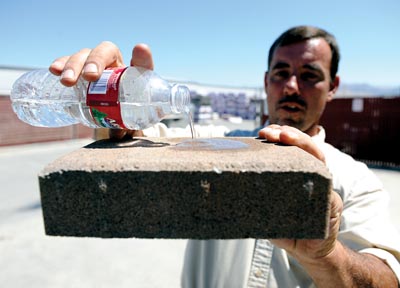
They may look like normal paving stones, but Paul Hathaway of
Pacific Interlock Pavingstone in Hollister makes sure to stress how
they are not
– instead, they are specially designed for water efficiency and
could lead to major expansion.
They may look like normal paving stones, but Paul Hathaway of Pacific Interlock Pavingstone in Hollister makes sure to stress how they are not – instead, they are specially designed for water efficiency and could lead to major expansion.
The stones look and feel like any other, but because of certain materials – which Hathaway won’t reveal because the product remains patent pending – and the way the stone is produced, capillaries allow water to seep through and into the soil beneath.
“It’s a great, green product,” Hathaway said.
And the permeable stone is starting to become popular throughout the area, he said. The stone has been installed in dozens of places throughout California, including Morgan Hill’s Community Park Tennis Courts and Hollister’s Dunne Park, he said. The stones still are in consideration to be installed at the new site of the Gilroy Public Library.
The number of locations using the stone will keep on growing, Hathaway believes, as he continues to visit towns and business weekly explaining the benefits of the paver that is stronger and safer than concrete.
Here is video of water absorbing in time-lapse photography. Below, the story continues.
At Dunne Park, the stones were donated as part of the Water-wise Conservation Garden, which teaches Hollister residents the best way to save water, said Shawn Novack, water conservation program manager at the Water Resources Association of San Benito County.
“It (the stone) helps fix runoff problems,” Novack said. “It allows all the water to stay on the property instead of going into the gutters and into our water systems.”
Most water-permeable stones allow a rush of water through, but the Hydro-Flo stones don’t. The “upside-down tree-like pathway” in the stones – that is the way the water spreads – makes it seep out slowly, never allowing the stones’ base to flood. The paver also prevents slipping because puddles sink quickly into the rock – unlike concrete.
“We did this on purpose to allow the water to infiltrate the ground slowly,” said Hollister Plant Manager Tim Donovan with Pacific Interlock. “Delaying it (the water) is a huge benefit – it’s not going to flood.”
Donovan was part of the team that created the stone’s structure over an 18-month time period. The stone was perfected only 9 months ago.
The process evolved every day, Donovan said. They kept changing the materials and formulas until the rock would allow the water to seep through, but still hold enough density to withstand 8,000 pounds per square inch. Eventually, the formula called for mostly recycled materials.
When water is poured onto the paver, it soaks in and isn’t released until 12 percent of the rock’s weight is filled with water.
“There is a good balance between strength and structure,” Donovan said.
It differs from other pavers that are considered permeable because it’s not based of holes in the design and there are no gaps between each rock. Normal permeable pavers leave a gap for water to flow through – which also creates a possible hazard.
For Hathaway, safety is what pushes the new pavers above the rest, he said.
The stones’ ability to soak in water and release it prevents puddles and makes it safer than concrete or asphalt, Hathaway said.
“I wouldn’t be talking about this product if it wasn’t as safe as it is,” Hathaway said.
Because of the stone’s possibilities, big changes are expected soon for the company.
Pacific Interlock Pavingstone, Inc., where half their employees are Hollister residents, expects to expand its business in the next year due to the stone.
The pavers are being installed at Santa Clara University, and Hathaway is hoping to install the stones at the new San Benito County Courthouse, while Hathaway still is looking for more projects.
The manufacturing plant, which has called Hollister home for 31 years, is hoping to expand nationally and worldwide in the next few years – but still keep a plant in the area.
Hathaway considers it important to keep the company local and, with expansion, open more job possibilities, he said.
“This is an investment in this city and this community. There are going to be a lot of good manufacturing jobs coming out of this product.”
Look back for video.









